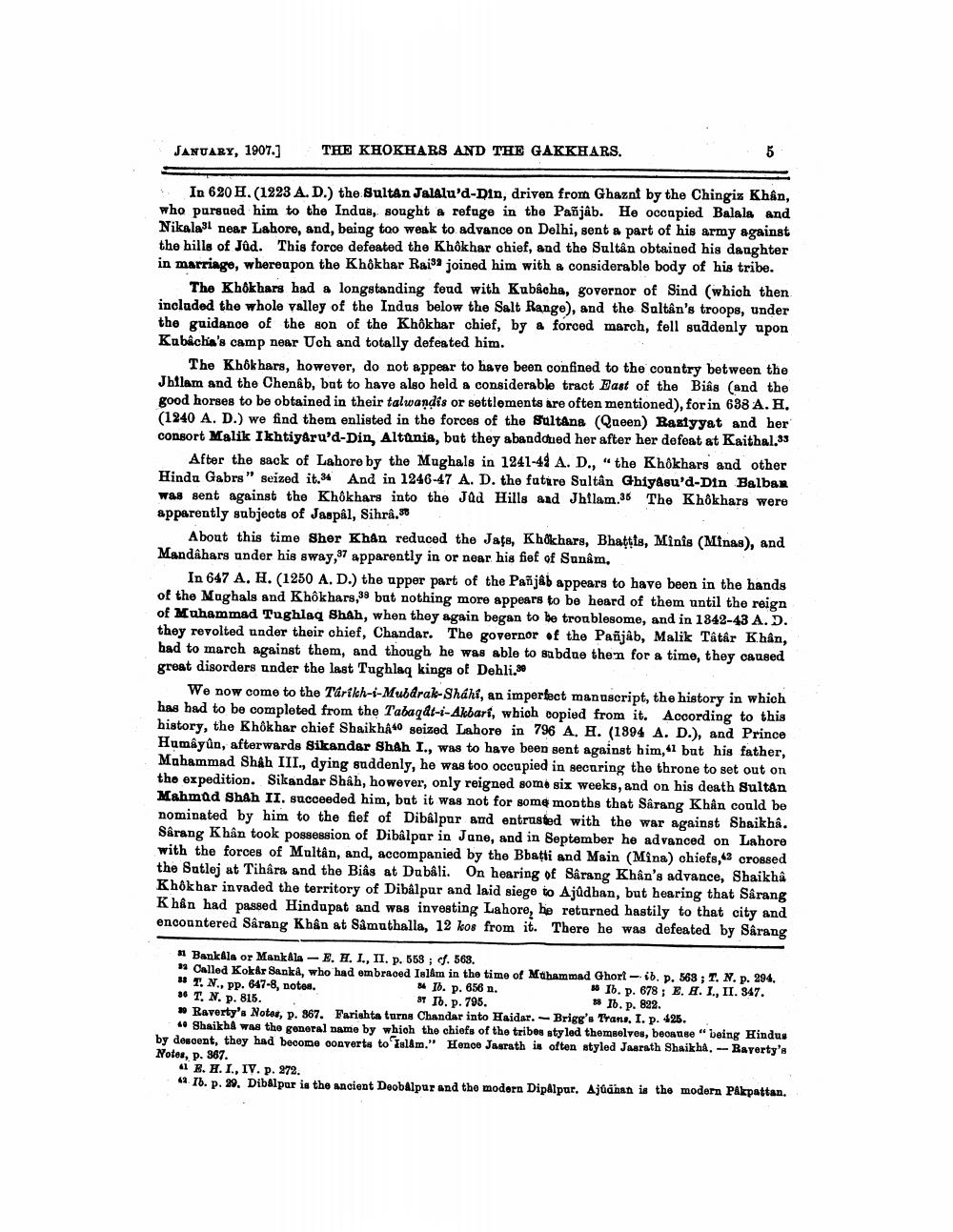________________
JANUARY, 1907.]
THE KHOKHARS AND THE GAKKHARS.
5
In 620 H. (1223 A. D.) the Sultan Jalalu'd-Din, driven from Ghaznt by the Chingiz Khan, who pursued him to the Indus, sought & refage in the Pañjab. He occupied Balala and Nikalal near Lahore, and, being too weak to advance on Delhi, sent a part of his army against the hills of Jûd. This force defeated the Khôkhar chief, and the Sultan obtained his daughter in marriage, whereapon the Khokhar Rai' joined him with a considerable body of his tribe.
The Khokhars had a longstanding foud with Kubicha, governor of Sind (which then included the whole valley of the Indus below the Salt Range), and the Sultan's troops, under the guidance of the son of the Khôkhar chief, by a forced march, fell suddenly upon Kabâcha's camp near Uch and totally defeated him.
The Khok hars, however, do not appear to have been confined to the country between the Jhilam and the Chenab, but to have also held a considerable tract East of the Biâs and the good horses to be obtained in their talwandis or settlements are often mentioned), forin 638 A. H. (1240 A. D.) we find them enlisted in the forces of the Sultana (Queen) Bastyyat and her consort Malik Ikhtiyâru'd-Din, Altania, but they abandcrued her after her defoat at Kaithal.33
After the sack of Lahore by the Mughals in 1241-49 A. D.," the Khokhars and other Hindu Gabrs" seized it.34 And in 1246-47 A. D. the fatire Sultân Ghiyasu'd-Din Balban was sent against the Khôkhars into the Jud Hills and Jhflam.36 The Khôkhars were apparently subjects of Jaspal, Sihra.
About this time Sher Khan reduced the Jats, Khokhars, Bhattis, Minis (Minas), and Mandahars under his sway,97 apparently in or near his fief of Sunam,
In 647 A, H. (1250 A. D.) the upper part of the Pañjab appears to have been in the hands of the Mughals and Khôkhars, but nothing more appears to be heard of them until the reign of Muhammad Tughlaq Shah, when they again began to be troublesome, and in 1842-43 A. D. they revolted under their chief, Chandar. The governor of the Pañjâb, Malik Tâtâr Khan, had to march against them, and though he was able to subdue then for a time, they caused great disorders ander the last Tughlaq kings of Dehli.30
We now come to the Tarikh-i-Mubdrak-Shahi, an imperfect manuscript, the history in which has had to be completed from the Tabaqdt-i-Akbars, which copied from it. According to this history, the Khôkhar chief Shaikhảo seized Lahore in 796 A, H. (1894 A. D.), and Prince Humâyûn, afterwards Sikandar Shah I., was to have been sent against him, but his father, Mohammad Shah III., dying suddenly, he was too occupied in securing the throne to set out on the expedition. Sikandar Shah, however, only reigned some six weeks, and on his death Sultan Mahmad Shah II. succeeded him, but it was not for some months that Sarang Khân could be nominated by him to the fief of Dibâlpur and entrusted with the war against Shaikhâ. Sârang Khân took possession of Dibâlpur in Jane, and in Beptember he advanced on Lahore with the forces of Multân, and, accompanied by the Bbatti and Main (Mina) chiefs, crossed the Sutlej at Tihara and the Bills at Dubâli. On hearing of Sârang Khân's advance, Shaikhâ Khokhar invaded the territory of Dibalpur and laid siege to Ajůdhan, but hearing that Sarang Khân had passed Hindupat and was investing Lahore, he returned hastily to that city and encountered Sarang Khên at Simuthalla, 12 kos from it. There he was defeated by Sârang
BankAla or Mankala - E. H. I., II. p. 558; d. 563. * Called Kokar Sanka, who had embraced Islam in the time of Muhammad Ghort - ib. p. 563 ; T. N. p. 294. # T, N., PP. 647-8, notes.
4 10. p. 656 n.
10 lb. p. 678; E. A. I., II. 347. 36 T. N. p. 815.
ST I. p. 795.
88 Ib. p. 822. * Raverty's Notas, p. 367. Farishta turns Chandar into Haidar. - Brigg's Trans. I. p. 425.
4. Shaikh was the general name by which the chiefs of the tribes styled themselves, because "being Hindus by descent, they had become converts to Zalám." Hence Jagrath is often styled Jasrath Shaikha. -- Bayerty's Notes, p. 367.
« R. H. I., IV. p. 272. ** Ib. p. 99. Dibalpur is the ancient Deobalpur and the modern Dipdlpur. Ajtänan is the modern Pakpattan.




